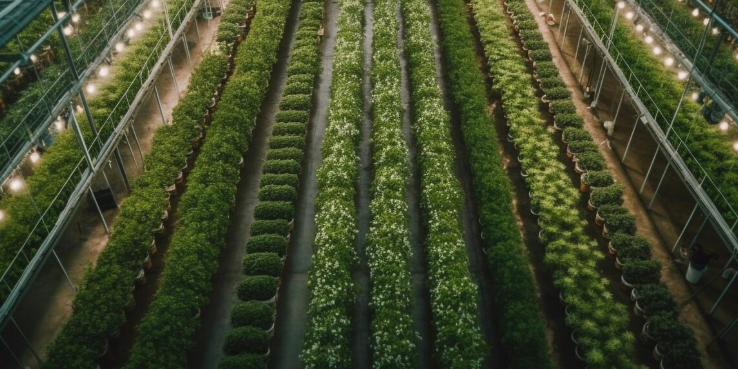Picture this: your field whispers its secrets. It whispers about thirsty patches yearning for a precise sip, hungry roots craving the perfect blend of nutrients, and hidden threats lurking in the shadows. In the Future of Precision Farming Technologies, these whispers aren’t just dreams – they’re decoded by advanced technologies and transformed into actionable insights, guiding your hand to cultivate bountiful harvests while dancing with sustainability. So, strap yourselves in, fellow stewards of the soil, because we’re about to dive into the fascinating world of the next-gen tech revolutionizing agriculture!

AI Ascendant: The Rise of the Robot Farmhand
Imagine robots, not Rosie from the Jetsons, but sophisticated machines, zipping through your field, tirelessly monitoring plant health, meticulously applying fertilizer, and even gently weeding rogue sprouts. Artificial intelligence (AI) is rapidly evolving, and the Future of Precision Farming Technologies sees it taking center stage. AI-powered robots will analyze data from sensors and drones, learning to identify individual plant needs and perform tasks with an accuracy and efficiency no human can match. This robotic workforce will free farmers from backbreaking labor, allowing them to focus on the bigger picture, optimizing operations and strategizing for maximum yield.
The Drone Delivery Revolution: Taking to the Skies for Precision
Forget lugging heavy equipment across vast fields. The Future of Precision Farming Technologies takes to the skies! Advanced drones, equipped with multispectral cameras and sophisticated sensors, will paint a detailed portrait of your field from above. These aerial eyes map nutrient deficiencies, detect pest infestations, and even monitor irrigation coverage, providing you with a bird’s-eye view of your land’s health in real-time. Imagine drones not just gathering data, but even delivering targeted pesticides or fertilizer to specific areas, minimizing waste and maximizing impact. The sky’s the limit (literally!) when it comes to drone-powered precision in the future.
The Hyperconnected Field: A Symphony of Sensors and Data
Forget clunky, unreliable sensors of the past. The Future of Precision Farming Technologies is a hyperconnected field, where a network of sophisticated sensors embedded in the soil, perched on towers, and even woven into plant leaves whisper crucial data about moisture levels, nutrient content, and even plant stress. This symphony of sensors paints a high-resolution picture of your field’s health, allowing you to identify problems before they blossom, optimize irrigation schedules, and personalize fertilizer applications with an unmatched level of precision. Think of it as having a field-wide nervous system, constantly feeding you vital information about your land’s needs.
The Blockchain Bounty: Building Trust in a Data-Driven World
Data, the lifeblood of precision farming, needs a secure vault. And the Future of Precision Farming Technologies proposes blockchain technology as the key. Blockchain, a tamper-proof digital ledger, tracks and verifies every piece of data, from sensor readings to drone reports to market transactions. This transparent system builds trust between farmers, consumers, and stakeholders, ensuring quality, traceability, and fair pricing in the agricultural ecosystem. Imagine knowing exactly where your food comes from, how it was grown, and even who nurtured it – blockchain makes this a reality in the future of precision farming.
The Green Guardian: Precision with a Sustainability Soul
Future of Precision Farming Technologies isn’t just about maximizing yields; it’s about protecting our planet. Advanced technology will help us minimize water waste, reduce chemical runoff, and promote soil health. Imagine sensors predicting droughts and optimizing irrigation, AI analyzing weather patterns to guide sustainable planting choices, and robots minimizing soil erosion with targeted tillage. This data-driven approach to farming paves the way for a future where bountiful harvests go hand-in-hand with environmental responsibility, ensuring a healthy planet for generations to come.
The Personalized Plate: From Field to Fork, Tailored to You
The Future of Precision Farming Technologies isn’t just about feeding the masses; it’s about catering to individual needs. Imagine smart farming technologies analyzing soil data and genetic makeup to create custom blends of nutrients for specific crops, tailored to optimize their nutritional content. This personalized approach can even lead to crops tailored for regional taste preferences or specific dietary needs. Think of it as your field whispering not just its own secrets, but the secrets of how to nourish people in the most personalized and delightful ways.
The Affordability Enigma: Is the Future Just for Big Bucks?
Let’s be honest, technology comes with a price tag. But here’s the good news: the Future of Precision Farming Technologies is becoming increasingly accessible, thanks to a combination of falling tech costs, innovative financing models, and even government subsidies in some regions. Don’t let the initial investment scare you off – remember, the long-term savings in water, fertilizer, and increased yields can often offset the initial costs, turning your investment into a blossoming seed of prosperity. This democratization of technology ensures that even small farms can reap the benefits of the future, paving the way for a more equitable and sustainable agricultural landscape.
The Convergence Conundrum: When Tech Meets Biology
The Future of Precision Farming Technologies isn’t just about gadgets and software; it’s about a beautiful convergence of technology and biology. Imagine CRISPR gene editing being used to create crops resistant to pests or drought, or vertical farming towers sprouting in urban centers, powered by AI-controlled climate systems. This fusion of tech and biology holds immense potential for boosting yields, minimizing environmental impact, and even creating customized food varieties with specific nutritional profiles. The future of farming is one where nature and technology dance hand-in-hand, pushing the boundaries of what’s possible.
The Seeds of Change: Sowing the Future of Food
The Future of Precision Farming Technologies isn’t just a technological trend – it’s a revolution. It’s a revolution that whispers promises of abundant harvests, a revolution that dances with sustainability, and a revolution that empowers farmers to become data-driven stewards of the land. So, are you ready to join the movement? Are you ready to plant the seeds of change and harvest the fruits of a data-driven future? Share your thoughts in the comments below – let’s build a vibrant community of farmers, technologists, and food enthusiasts, all united by a common goal: to cultivate a future where technology and nature join hands to nourish the world, sustainably and deliciously!
Additional Resources:
Categories:
Latest Posts:
FAQs:
What is precision farming and why is it important for the future of agriculture?
Precision farming, also known as smart farming, is an approach that uses modern technology to observe, measure, and analyze the needs of individual fields and crops. It’s important for the future because it allows farmers to apply resources like water and fertilizer with high accuracy, reducing waste, increasing yields, and promoting sustainability. It shifts farming from a broad, guesswork-based approach to a data-driven science.
How is AI being used in precision farming?
AI is becoming the “robot farmhand” of precision farming. AI-powered robots and systems analyze data from sensors and drones to perform tasks like monitoring plant health, applying fertilizer, and weeding with high accuracy. This technology helps farmers make better decisions and automates labor-intensive tasks, improving overall efficiency and productivity.
What role do drones play in modern agriculture?
Drones are taking to the skies to provide a “bird’s-eye view” of fields. Equipped with multispectral cameras and advanced sensors, they can quickly map out nutrient deficiencies, detect pests, and monitor irrigation in real-time. Drones can even be used to deliver targeted applications of pesticides or fertilizers, minimizing waste and ensuring precise treatment.
How do sensors contribute to precision farming?
Sensors are the “nervous system” of a modern farm. A vast network of sophisticated sensors embedded in the soil, on towers, and even on plants, collects critical data on moisture levels, nutrient content, and plant stress. This continuous stream of information provides farmers with a high-resolution picture of their field’s health, enabling them to address issues proactively.
What is the benefit of using blockchain in farming?
Blockchain technology acts as a secure, tamper-proof digital ledger for farm data. It tracks and verifies every piece of information, from a plant’s origin to its journey to the consumer. This transparency builds trust in the supply chain, ensuring traceability, promoting fair pricing, and giving consumers confidence in the quality and origin of their food.
How does precision farming technology contribute to sustainability?
Precision farming is a “Green Guardian” for the environment. By allowing for the highly targeted application of inputs like water and chemicals, it helps farmers minimize water waste and chemical runoff. The technology also aids in conserving soil health and promoting sustainable practices, leading to a more environmentally responsible food production system.
Is precision farming technology only for large-scale operations?
No, the future of precision farming is becoming more accessible. While initial investments can be high, the costs of technology are falling, and new business models like “Software as a Service” (SaaS) and innovative financing options are emerging. These solutions make it possible for even small and medium-sized farms to adopt and benefit from these technologies.
How does technology personalize food production?
By combining data from soil sensors with genetic information, smart farming technologies can create custom nutrient blends for specific crops. This allows for the production of food with enhanced nutritional content, tailored for specific taste preferences or dietary needs, creating a “personalized plate” from farm to fork.
How does precision farming help farmers adapt to climate change?
Precision farming provides a “weatherproof shield” against climate uncertainty. By analyzing real-time weather data and creating predictive models, farmers can make informed decisions. The technology helps them plan for drought conditions, implement flood mitigation strategies, and adjust their practices to build a more resilient farm that can thrive in a changing climate.
What is the “Convergence Conundrum”?
The “Convergence Conundrum” refers to the merging of technology and biology in agriculture. It involves using advanced tools like AI and CRISPR gene editing to create crops that are more resilient to pests or drought. This fusion of tech and nature holds immense potential to boost yields and minimize environmental impact, representing the ultimate dance between science and biology.


